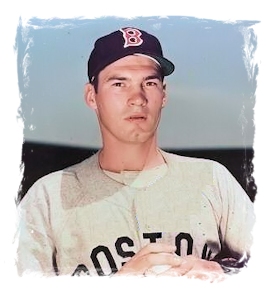 |
Chuck Stobbs was born on July 2, 1929 in Wheeling, West Virginia. He came from an athletic lineage. His father, T. William Stobbs, had been an All-American football player who played the 1921 season with the Detroit Tigers football team. By the time Chuck reached high school, the family was in Norfolk and he attended Granby High School, where he ranked as an All-State athlete in football, basketball, and baseball for two years running. He was probably a better football player than he was a baseball player but he chose to go into baseball. Though primarily a pitcher, Chuck was a first baseman on the Granby High team that played in the 1945 state All-Star game. In June 1946, he pitched for the Eastern Virginia All-Star team, defeating the Western Virginia team, 7-1. He was named the outstanding player of a 1946 All-Star baseball game held in Chicago. He was given a scholarship to Duke, but the money he was offered by the Red Sox was too compelling. The Red Sox had to keep him on the big league club in 1948 and 1949, the two years after his signing, but were able to farm him out in 1947, the year of his signing. In his signing year, he pitched for the Lynn Red Sox in the New England League, posting a 9-2 record and a 1.72 ERA. He appeared in his first major league game in September. Chuck threw only seven innings in all of 1948 and recorded no decisions, with a 6.43 ERA. In 1949 he finally hit his stride., winning 11 and losing six, with a 4.03 ERA, but for the third year in a row walked more than he struck out. He walked more than he struck out again in 1950, but had his best year at the plate in 1950, batting .246 (14-for-57), with 12 walks to his credit and nine RBIs. There was a time early in 1951 when it looked as though he was heading into the Army, but was rejected twice due to asthma. He finished the seasonwith a 4.76 ERA, and was dealt in November to the White Sox. Chuck spent just the 1952 season with the White Sox, with an excellent 3.13 earned run average. After the season, Chicago traded him to the Washington Senators. He suffered two disastrous seasons (1955: 4-14, 5.00 ERA, and 1957: 8-20, 5.36 ERA), not at all helped by a team that finished last in both years The biggest headlines from the Washington years came early in his first season when Mickey Mantle slammed a home run off him that went completely out of Washington’s Griffith Stadium on April 17th and estimated at 565 feet. The storied blast was one of the longest home runs ever hit in major league baseball. Becoming a 20-game loser in 1957 was discouraging. Chuck lost his first 10 starts, one after the other, and every one of his first 11 decisions. He always started poorly, due to the asthma, but when he dropped his first three decisions in 1958 and found himself at 2-6 by late June, he may not have been surprised to find himself sold to the St. Louis Cardinals during the All-Star break. When the Cardinals placed him on waivers in January, no one bit and he was given his release. He signed again with Washington as a free agent, posting the best earned run average of his major league career at 2.98. In 1960, he won as many games as all three years combined, posting a 12-7 record with a 3.32 ERA. For the Twins, he started three games, relieved in 21, and went out with a whimper. His last appearance came in August, where he gave up two singles, threw a wild pitch, and walked two batters, forcing in a run. That was enough. Four batters, all reached base and all scored. He finished the year 2-3 (7.46 ERA) and was given his release in October. After baseball, he took a position with the Jim Parker Insurance Agency in Silver Spring, Maryland. He broadcast Washington Senators baseball in 1969, the first year Ted Williams managed the team. In May 1970, Chuck took on additional duties when he accepted an appointment as baseball coach at George Washington University, where he’d been assistant coach the year before. Early in 1971, he resigned to take a position as pitching coach with the Kansas City Royals baseball academy in Sarasota which he did through 1976. He also worked with the Indians from 1979 to 1981 and then retired. Chuck Stobbs was diagnosed with throat cancer and it flared up throughout 2006. By early 2007 he had begun to prevail in the ongoing battle, but he died on July 11, 2008 in Sarasota, Florida. He was 79 years old. |
|||||
